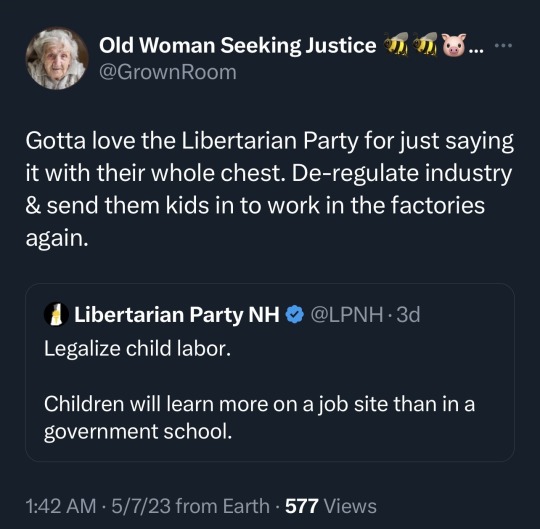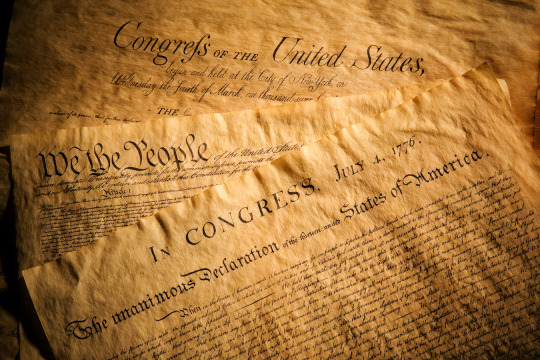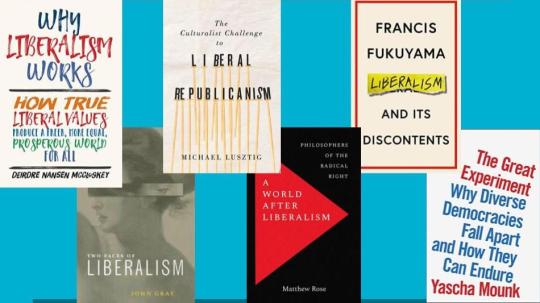#classic liberalism
Text
By: Joel Kotkin
Published: Jun 21, 2023
In an age of darkness, glimpses of light are rare — but all the brighter for it. As the censorious progressivism embraced by Joe Biden and much of his Democratic party grows into an increasingly pervasive quasi-religion, ordinary people are finding ways to push back. Like democratic Leftists in the Cold War, old-style liberals are becoming a key force in challenging today’s new orthodoxies.
And this rising tide of liberal apostasy, coupled with a growing pushback from grassroots businesses and consumers, represents a far more profound challenge to the established order than the one routinely mounted by conservatives. In the Renaissance, the impetus for change did not come from Jews, Muslims, devil-worshippers or pagans, but devout Christians such as Erasmus, Luther and Calvin.
In our era, the most powerful critics of progressive theology once again tilt to the Left: Andrew Sullivan, Matt Taibbi, Ruy Teixeira, to name but three. Their apostasy rises to uphold the basic principles once central to liberalism — equality of opportunity, free speech, and open inquiry. This battle is also reminiscent of the struggle waged by the Renaissance critics of the all-powerful Catholic Church. Today, it’s not bishops or popes who seek control, but the oligarchs and their media platforms which, with the sometimes exception of Twitter, favour a censorship regime that brands dissidents largely as purveyors of “misinformation”.
Like earlier apostates, religious or scientific, ours face an uphill struggle. They must contend with forces within the C-suite and, particularly, academia, where even the sciences are now constrained by ideological edicts. This is where the money flows, often to a host of non-profits, some secretly funded, that spread the gospels of censorship, police reduction, indoctrination in schools and an apocalyptic environmental agenda. One problem the apostates face is therefore an obvious one: despite often impressive media resumes, their research rarely makes it into the mainstream, their voices being carried no further than Twitter, Substack and the more broad-minded corners of the media.
This pushback comes at a propitious time, extending beyond a few dissident intellectuals to the grassroots and business moguls such as Elon Musk, Ken Griffin and Bernie Marcus. The latter, in particular, understand that the new progressive orthodoxy undermines the entire system by embracing anti-capitalist memes and reducing the role of merit in a system built around it. And so a critical front has been the rebellion against ESG (environmental, social, governance) standards. Many US states have moved to take their pension funds out of firms that embrace this ideology; some investment houses, notably Vanguard and upstart Thrive Asset Management, are eschewing corporate policies that stress climate change and other issues over fiduciary obligation to investors.. The fact that returns to ESG firms have been poor, when compared with those tied to fossil fuels and basic industries, could presage a further awakening among financial and business leaders that the balance sheet, rather than ideological back-slapping, constitutes the primary mission of business.
More important still, apostasy is also rising among the general population. The pressure for reparations, for example, is opposed by upwards of two-thirds of Americans. All major ethnic groups, notes Pew, reject race quotas, including African-Americans; overall, almost three in four oppose this, as do a majority of both Democrats and Republicans.
In the race debate, the role of black apostates is particularly critical. As John McWhorter has long argued, preferential policies encourage “therapeutic alienation” among black people and other minorities — leading some to adopt a mentality of “anger and scapegoating”, instead of doing “the work needed for success”. In the bizarre world of modern progressivism, any opposition to this agenda is “racist”, even if it comes from people who support equal rights and access to opportunity. Critics of race-based discrimination such as McWhorter and Glenn Loury are far from Klansmen incarnate.
Similarly, assaults on European culture have proven unlikely to win over the masses in these countries, the bulk of whom still express some pride in their heritage. The notion that Western societies are eternally oppressive and racist seems a bit of a stretch given that millions of Africans, Middle Easterners, and south Asians continue to flock to these countries, largely to experience higher levels of economic and cultural freedom. The progressive assault on heritage also is likely to stir up far-Right sentiment, as we can see in France, Denmark, and, perhaps most dangerously, Germany.
The ever-more edgy cultural agenda of the Left, particularly its obsession with transgenderism, provides additional fuel for apostasy. People generally believe in the existence of two genders, and are hostile to efforts to impose either sexual or explicitly political curricula on young people. The idea of parental rights, for example — making sure parents are informed if their child decides to transition — has broad support, including nearly four-fifths of Californians, reflecting what appear to be national trends. In defiance of the transgender advocacy from the White House down, the opposition to sporting categories based on gender, rather than sex, has actually grown over the last two years, with even more Democrats now opposed to the practice than in favour.
Critically — and, no doubt, shocking for some — many opposing the progressive agenda are themselves minorities. In Britain and Europe, for example, Muslims tend to be more religious and socially conservative than whites, and Indians, particularly Hindus, have been drifting Right-wards for a generation. In America, surveys show that foreign-born Americans are also more culturally conservative than the native-born.
Perhaps the most economically significant apostasy relates to climate-change policy. Despite growing moves to censor contrary opinions, here the liberal apostates are not classic deniers or oil company executives, but respected scientists such as former Obama advisor Steve Koonin, and climate scientists Roger Pielke and Judith Curry. Even some environmentalists — including Greenpeace co-founder Patrick Moore — openly denounce “Net Zero” and “de-growth” policies as both impractical and deeply flawed. They recognise that these policies are already leading to the immiseration of poorer people, particularly in California and Germany. They are not calling for an end to climate change mitigation, but for policies that are more realistic and less economically damaging for the working and middle classes.
And then there are grassroots protests at European governments’ attempts to impose emission reductions on farmers and ban chemical fertilisers — regulatory moves at a time when food prices are rising throughout the West. Efforts to reduce agricultural output, now being suggested in the United States and Canada, also could have dire consequences for billions in the developing world. It’s hardly surprising, then, that there is growing scepticism about climate policies globally; in surveys, it barely registers as a priority for people either in Africa or the US where, according to Gallup, climate is stated as a primary concern for barely 2% of the population.
Other troubles, notably the loss of industry amid soaring energy costs, are already creating a popular backlash, which has been a boon for the far-Right in Germany and Italy, among others. Some centrist regimes have taken fright, with France’s Emmanuel Macron stepping back from climate extremism. Less than a year ago, Germany signed an EU target to ban the sale of cars with internal combustion engines by 2035, but quickly backtracked.
Overall, for all the talk of ideological polarisation, public opinion may well be tilting more towards the apostates than those of the progressive zealots. Despite the media profile of Alexandria Ocasio-Cortez and her fellow “Squad” members, the majority of Democrat members consider themselves moderate or conservative, while barely one in four sees themselves as “very liberal”.
Of course, even with public support, supporters of traditional liberal values face a number of challenges when it comes to enacting meaningful political change. But there is some good news. Many companies are now rethinking their marketing strategies in the face of negative consumer reaction. There are even glimmers of hope for liberal apostasy in some big cities, as demonstrated by the election of New York’s pro-police Eric Adams and San Francisco’s recall of progressive school board members.
As was the case during the Reformation, the apostate’s course is still not an easy one. But their critique remains critical to undermining the current progressive theology — a far more effective weapon than the reactionary antics of DeSantis, which are focused primarily on Right-leaning GOP voters. In contrast, the apostates speak the same language and share many of the values that once constituted progressive ideals. They are, in other words, both the key to restoring rationality — and to keeping liberalism alive for future generations.
==
I'm a-Woke for the exact same reasons I'm a-theist.
#Joel Kotkin#classic liberalism#liberal ethics#liberal values#liberalism#illiberalism#woke nonsense#woke#wokeism#wokeness as religion#cult of woke#wokeness#centrism#the sane middle#tribeless#politically homeless#religion is a mental illness
11 notes
·
View notes
Text
I love you people going into "useless" fields I love you classics majors I love you cultural studies majors I love you comparative literature majors I love you film studies majors I love you near eastern religions majors I love you Greek, Latin, and Hebrew majors I love you ethnic studies I love you people going into any and all small field that isn't considered lucrative in our rotting capitalist society please never stop keeping the sacred flame of knowledge for the sake of knowledge and understanding humanity and not merely for the sake of money alive
#classics#mythology#ancient greek mythology#ancient roman mythology#comparative literature#latin#hebrew#ethnic studies#fuck capitalism#communism#i love my useless degree idc#academia#university#dark academia#Greek#philosophy#liberal arts#humanities#women and gender studies#cultural anthropology
37K notes
·
View notes
Text



In general, blue and red are commonly associated with opposing political ideologies that are featured on this flag to unite both parties together.
Blue often represents conservative or right-leaning ideologies, while red is associated with progressive or left-leaning ideologies accepting the United States because the Democratic Party uses blue as their color as the Republicans use red.
However, these associations are not universal, and the meanings can vary depending on the cultural and political context.
Purple is sometimes used as a symbol of unity or bipartisanship, as it is a combination of blue and red to bridge the gap between the opposing parties and bring together bipartisan ideas.
It is seen as a color that bridges the divide between the two major political ideologies and in some cases, purple can also be associated with social movements that advocate for nonpartisan or centrist policies.
In general, blue and red are commonly associated with opposing political ideologies. Blue often represents conservative or right-leaning ideologies, while red is associated with progressive or left-leaning ideologies. However, these associations are not universal, and the meanings can vary depending on the cultural and political context.
Purple is sometimes used as a symbol of unity or bipartisanship, as it is a combination of blue and red. It is seen as a color that bridges the divide between the two major political ideologies. In some cases, purple can also be associated with social movements that advocate for nonpartisan or centrist policies.
It's worth noting that political symbols and their meanings can change over time, and different groups may adopt different interpretations. Therefore, it is important to consider the specific context and region when trying to understand the meaning of a particular flag or combination of colors in politics.
#liberal conservatives#liberalism#centrism#national unity#conservatives#classic liberalism#politics#clean politics#equality#tolerance#respect#bipartisan#liberals
0 notes
Text
At its core, every piece of media we ever have consumed and ever will consume — whether it’s art, music, books, movies — is fundamentally about love, or the lack of it.
it’s an inescapable facet of human life. it could be about the love you have for people in your life, or how much you hate your job, or love your city, but the love is always there.
#literature#academia#dark academia#poetry#classics#english major#theater#theatre#music#art#light academia#books#reading#jane austen#dark academia aesthetic#museums#liberal arts#university#student#artist#latinx artist
922 notes
·
View notes
Text
Neoliberalism in brief
Of the endless debate about what "neoliberalism" is, the important thing is in which essential way it differs ("neo") from classic ("whig", "libertarian") liberalism, and I think that can be answered briefly, as libertarianism mixed with rentierism:
Tight fiscal policy, loose credit policy.
Globalist "whig" on labour, goods and services markets but nationalist "tory" on asset markets.
Small government spending as to supporting people and industry, big government spending (including massive central bank intervention) as to supporting finance, real estate, military contractors.
The political background is that while classical liberals were in large part "new money" whig industrialists fighting "old wealth" tory rentiers, in the neoliberal era many industrialists are allied with rentiers because they have become in large rentiers themselves, having over time used "new money" to acquire "old wealth", so their interests are in part "whig" and in large part "tory", and this has allowed a resurgence of "tory" politics along the dominant "whig" ones.
«the Amstrad founder had given him tips on creating long-term wealth. “Lord Sugar said you make money from property and do business for fun. Many of our customers make money from property and I’d love to go into property development one day,” said Mr Wright.»
1 note
·
View note
Text











the terror (2018) // the odyssey, trans. emily wilson
#the terror#the terror amc#francis crozier#continuing my saga of greco-roman classics x poor quality terror screenshots#'ohhhhh a liberal arts degree has no utility' What's This Then Motherfucker.
2K notes
·
View notes
Text
btw if you’re starting college this week everyone else is also nervous about making friends. everyone feels lonely and out of place. and everyone thinks that everyone else is doing a better job than they are.
it’s a weird life transition & you’re doing a good job.
#studyblr#adhd studyblr#grey academia#adult adhd#chaotic academia#study inspiration#study space#study notes#studyspo#classics#liberal arts#bookblr#booklr#college#adhd#adhd problems#academia aesthetic#adhd stuff#dark academia
3K notes
·
View notes
Text
When you get so irked by someone saying that "Clive and Maurice were the better romantic pairing because they truly loved each other while Alec and Maurice's relationship was based on nothing but sex" that you end up writing a small essay in a Pinterest comment section (which had to be broken up into 500 character chunks because of Pinterest's character limit).





Anyway, I actually like what I wrote so I wanted to share it here. I didn't say everything I wanted to in the exact way that I wanted to due to the word restrictions, but I think it did the job.
#maurice em forster#maurice 1914#maurice 1987#maurice 1971#maurice#maurice/alec#maurice/clive#em forster#e.m. forster#maurice hall#alec scudder#clive durham#queer literature#queer liberation#classic literature
159 notes
·
View notes
Text

#child labor#child abuse#child development#children#traditional moral values#libertarian#republican#constitutional originalism#classical liberal#conservative#fuck capitalism#capitalism#social issues#anti capitalism#late stage capitalism#current events#corporations
250 notes
·
View notes
Text
"All roads lead to Rome. That's why when I loved you, I thought you were Rome. Because all the roads, no matter how much I tried to trick, led nowhere but to you."
– Shahrazd Al-Khalij
"All roads lead to you, even those I took to forget you."
– Mahmoud Darwish
"You see love liberates. It doesn't bind, love says I love you. I love you if you're in china, I love you if you're across town, I love you if you're in harlem, I love you. I would like to be near you, I would like to have your arms around me I would like to have your voice in my ear but that's not possible now, I love you so go. Love liberates it doesn't hold. That's ego. Love liberates."
– Maya Angelou
#love liberates#all roads lead to you#dark academia#light academia#excerpts#fragments#literature quotes#book quotes#dark academia quotes#words#literary#classic literature#on love#love poem#romanticism#literary quotes#books and libraries#mahmoud darwish quotes#mahmoud darwish#shahrazd al-khalij#maya angelou#poetry#web weaving
494 notes
·
View notes
Note
Why do economists need to shut up about mercantilism, as you alluded to in your post about Louis XIV's chief ministers?
In part due to their supposed intellectual descent from Adam Smith and the other classical economists, contemporary economists are pretty uniformly hostile to mercantilism, seeing it as a wrong-headed political economy that held back human progress until it was replaced by that best of all ideas: capitalism.

As a student of economic history and the history of political economy, I find that economists generally have a pretty poor understanding of what mercantilists actually believed and what economic policies they actually supported. In reality, a lot of the things that economists see as key advances in the creation of capitalism - the invention of the joint-stock company, the creation of financial markets, etc. - were all accomplishments of mercantiism.
Rather than the crude stereotype of mercantilists as a bunch of monetary weirdos who thought the secret to prosperity was the hoarding of precious metals, mercantilists were actually lazer-focused on economic development. The whole business about trying to achieve a positive balance of trade and financial liquidity and restraining wages was all a means to an end of economic development. Trade surpluses could be invested in manufacturing and shipping, gold reserves played an important role in deepening capital pools and thus increasing levels of investment at lower interest rates that could support larger-scale and more capital intensive enterprises, and so forth.
Indeed, the arch-sin of mercantilism in the eyes of classical and contemporary economists, their interference in free trade through tariffs, monopolies, and other interventions, was all directed at the overriding economic goal of climbing the value-added ladder.
Thus, England (and later Britain) put a tariff on foreign textiles and an export tax on raw wool and forbade the emigration of skilled workers (while supporting the immigration of skilled workers to England) and other mercantilist policies to move up from being exporters of raw wool (which meant that most of the profits from the higher value-added part of the industry went to Burgundy) to being exporters of cheap wool cloth to being exporters of more advanced textiles. Hell, even Adam Smith saw the logic of the Navigation Acts!

And this is what brings me to the most devastating critique of the standard economist narrative about mercantilism: the majority of the countries that successfully industrialized did so using mercantilist principles rather than laissez-faire principles:
When England became the first industrial economy, it did so under strict protectionist policies and only converted to free trade once it had gained enough of a technological and economic advantage over its competitors that it didn't need protectionism any more.
When the United States industrialized in the 19th century and transformed itself into the largest economy in the world, it did so from behind high tariff walls.
When Germany made itself the leading industrial power on the Continent, it did so by rejecting English free trade economics and having the state invest heavily in coal, steel, and railroads. Free trade was only for within the Zollverein, not with the outside world.
And as Dani Rodrik, Ha-Joon Chang, and others have pointed out, you see the same thing with Japan, South Korea, China...everywhere you look, you see protectionism as the means of achieving economic development, and then free trade only working for already-developed economies.
#political economy#mercantilism#economic development#early modern state-building#early modern period#laissez-faire#classical liberalism#classical economics#economics#economic history
57 notes
·
View notes
Text







#omni american#liberalism#classic liberalism#liberal ethics#social order#illiberalism#liberal society#equality#equality under the law#free speech#freedom of speech#religion is a mental illness
16 notes
·
View notes
Text
Its insane that people read books just for good grades and not for the valuable perspectives and life lessons and artistic value and enjoyment they add to their lives
#literature#books#light academia#chaotic academia#dark academia#aesthetic#books and reading#life#university#college#liberal arts#classical literature
51 notes
·
View notes
Text

#Superman#old comics#golden age#silver age comics#1950s#classic#ye olde meme#ye olde internet#intersectionality#all american#as American as apple pie#comic books#family#American values#USA#usamerica#us America#America#us#us politics#wokeness#woke liberal madness#woke#transrights#lgbtqia#gay rights#lgbtq+#immigrants#inclusion#racial integration
29 notes
·
View notes
Text
The liberator episode 1







Capt sparks injured and treated..
#whump#male whump#the liberator#whumpedit#unique concepts#i like#classic yet not#shot#ww2#rescue#field medicine#wincing#hurt
71 notes
·
View notes
Text
The difference between victorian liberalism and neoliberalism
The term "neoliberalism" is a bit ambiguous, but whatever it means is rooted in the ideology of classic (victorian) liberalism, that is the primacy of markets, investors, individualism and globalization over institutions, workers, reciprocity and internationalism.
Neoliberalism for me largely coincides with the Washington Consensus and reaganism/thatcherism, and a classic liberal like Peter Mandelson summarized well in 2002:
“in the urgent need to remove rigidities and incorporate flexibility in capital, product and labour markets, we are all Thatcherites now”
And Tony Benn had already pointed out in 1993 the roots of that ideology in classic liberalism:
“These so called modernisers are really Victorian Liberals, who believe in market forces, don't like the trade unions and are anti-socialist.”
But "neoliberalism" is not quite the same "classic liberalism" and the major difference is that while classic liberalism applied to all areas of economic activity, and classic liberals opposed both conservatives/rentiers and progressives/socialdemocrats, and state intervention in any economic areas, neoliberals only oppose progressive/socialdemocrats, and strongly support land and finance based conservativism and rentierism, and support strong government intervention to support rentier interests in land and finance: in neoliberal states there are huge state (treasury and central bank) programmes to provide cheap massive credits and subsidies and low taxation to land (agricultural, commercial and residential land interests) and finance interests, and to backstop their losses, for enormous (trillions of dollars) amounts.
While classic liberals were in part allied with socialdemocrats against land and finance rentiers, as classic liberals and socialdemocrats both derived their incomes from industry, neoliberals are allied with land and finance rentiers against socialdemocrats, to the point of prioritizing land and finance interests over industry. Some of the reasons why:
Traditional industry has been deemed to be a breeding ground for labor unionism.
Much of traditional industry has been offshored to countries where independent labor unions are illegal or very weak and wages are low.
The ruling industrial elites have moved much of their capital into land and finance.
The political power of right-wing neoliberal parties (Republicans and Democrats in the USA, Conservatives and New Labour in the UK, ...) depends on the votes of mass land and finance rentiers, in particular the upper-middle classes voters who own share-based pension accounts and residential real estate.
Neoliberalism is the result of a union of convenience between the ideas and interests of classic liberals and conservative rentiers: hard global market competition for workers, generous national state welfare for real estate and finance.
#political economy#Economics#washington consensus#classic liberalism#whiggism#toryism#globalization#neoliberalism#liberalism#rentierism
0 notes